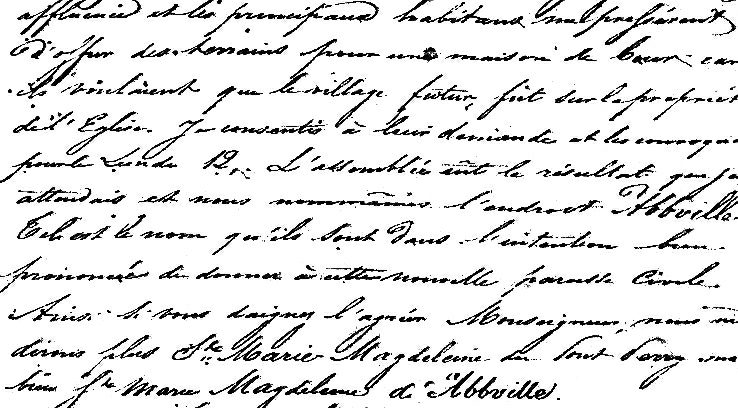
 The Naming of Abbeville
The Naming of AbbevilleIn the past, a controversy existed as to how Abbeville acquired its name. A historical marker claims that Abbeville was first named "La Chapelle." No researcher has ever found any documentary evidence to support that claim. When St. Mary Magdalen Catholic Church was the only Catholic church in Vermilion Parish, no doubt some of the Cajuns in the area, when they heard, "Allons à la chapelle," ("Let's go to the chapel"), understood that they were going to Abbeville, but no evidence exists that Abbeville was ever named "La Chapelle."
Père Antoine Désiré Mégret himself noted that the town was named "Abbville" from the time of its founding. (Note the missing "e" in the middle.) There were two theories as to why this name was chosen. One is that it was a combination of "Abbe" for Abbé Mégret and "ville" for town—the Abbé's town. The other is that it was named for Abbeville, France, which some believed to have been the birthplace of Père Mégret. Some support for the second theory could be found in the fact that the town in France is pronounced "Abbville" by the French.
The controversy may now be resolved. Dr. Mary-Theresa MacCarthy opens her article entitled "Un Autre Abbeville," (Bulletin de la Société des Antiquaires de Picardie, pp. 249-56, 2ême trimestre 1996) (a reprint of which with translation by Father Donald J. Hébert is available from www.hebertpublications.com), by stating:
"On 24 October 1995, before seven o'clock in the morning, the telephone rings in my room in New Jersey. In France, it is already time for siesta. Fr. Jean Desobry had discovered in the diocesan archives of Amiens the dossier of Fr. Antoine Jacques Désiré Mégret, who was born on 23 May 1797 at Abbeville 'dans la Somme' [in the Department of Somme] and was to become founder of Abbeville in Louisiana." [Father Hébert's translation.]
This statement strongly suggests that there is documentation in the dossier of Père Mégret in the Diocese of Amiens showing that he was indeed born in Abbeville, France. We had been unable to discover any such documentation from the time of Mégret's death in 1853 until now. Dr. MacCarthy further states that the first theory may also have played a part in naming the town:
"On February 12, 1844, the pastor gives to his American town the name of the town of his birth. The residents find this name especially fitting because of the French word abbé which means father added to the French word ville [which means town]. Their Abbeville is truly la ville de l'abbé [the priest's town]." [Gary Theall's translation.]
Thus it appears that in a sense both theories of the naming of the town are correct.
There is no doubt that the town was originally named "Abbville." This is clear from Mégret's own writings, as well as from early maps of the town and of the state. Here, excerpted from a letter Mégret wrote to his bishop on February 18, 1844, is his account of how the town was named:

" ... and the principal residents urged me to offer some land for a courthouse since they wanted the future village to be made on the property of the Church. I consented to their request and summoned them for Monday the 12th. The assembly had the result that I had expected, and we named the region Abbville. That is the name that they have the well declared intention to give to this new civil parish. Thus, if you deign to agree to it, Monsigneur, we no longer should have St. Mary Magdeleine of Perry's Bridge, but rather St. Mary Magdeleine of 'Abbville.' " [Gary Theall's translation.]
Before long, however, the middle "e" began to be inserted, perhaps to conform to the spelling, if not to the pronunciation, of the town in France.
[Document image courtesy of Kenneth A. Dupuy; story by Gary E. Theall.]